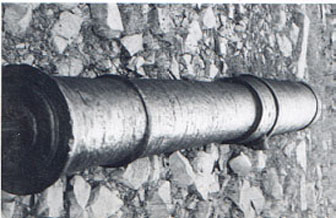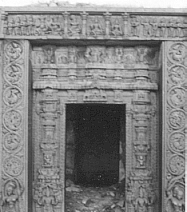|
Dadhi Reddi's heroics of trying to saving the fort from
capture and subsequently laying down his life were
remembered in the form of dance and drama for over
400 years in the surrounding villages of the Raichur
fort. Dadhi Reddi's son Krishna Reddy ruled Alampur
and Amangal area with Alampur (Mahaboobnagar, AP,
India) as his capital. They were basically sivaites
and ruled Alampur for Five generations. They had
spent all their time renovating & building the great
temples of Alampur, which was the most sacred place
for Sivaites after Kasi. His one of the famous
descendent Konda Reddy (1597-1643), the
last ruler of Alampur-- famously identified by the
well known monument called Konda Reddy Buruju in
Kurnool City(AP), had defeated Kurnool Nawab, a
subordinate of the Golkonda Kings several times and
was ultimately captured and was imprisoned in the
fortress, which subsequently became famous as Konda
Reddy Buruju, because of his valour and untiringly
resolve to fight the Muslim rulers. He escaped from
the fortress digging a tunnel across the River
Krishna to Alampur and ultimately lost his kingdom
to Golkonda Kings. The family then moved to
Practoor Fort around 1665 AD, which is
about 20km from Alampur.
|
They were the independent ruler of the small principality
of around 100 villages with Practoor Fort
as their head quarters, after the East India
Company took over the Kurnool and its
surrounding areas from Nizam. The next nine
successors lived at Practoor fort and the
favorite pass time was writing poetry. Most
prominent among these kings were Timma
Bhopalludu, who wrote a series of poems and
put them in a book called
"Anargaragamu". They
were very religious and always had progeny
problem. They
gifted a large amount of land of Tirupathi
Devasthanam for giving first arathi of the day
and in the process they became Vishnuvites
hoping that the kings of this line will always
have male descendents.
|

|
|
The kings of this line lost Practoor around
1790 AD due to death of their king
Narasimha Bhoopaludu (Pedda Narsimha Reddy)
who was poisoned by his cousins. His
wife Rani Chinnamma Devi took refugee
with Raja of Kollapur, who had considerable
influence with the British. Subsequently
there was an understanding with Nizam of
Hyderabad under the influence of the British
to let Rani Chinnamma Devi have a small
Jagir( Pallepad Jagir ) of Six
Villages with
Pallepad (Panyagrahi),as
Headquarters with absolute power. Rani
Chinnamma Devi had her own currency, which
was recognised by British and Nizam of
Hyderabad as they were in silver and gold
coins. Rani Chinnamma Devi had revenue
system, which was later incorporated in toto
, when India became a Republic in 1951 .The
history behind the name Pallepad was this
settlement was previously well know as
Panyagrahi. Due to the influence of Jainism
which took roots in this part of the world
due to the Patronage of Bijjuladeva,the most
known and important settlements of Jains had
Padu as suffix and such places with Jain
follower and temples were protected by then
imperial authority. Panyapadu subsequently
became Pallepadu.
|
|
The English had supported her all through the turbulent
years of succession and Kollapur Raja had
treated her as his daughter till she got the
jagir around 1795 AD. Raja of Kollapur also gave
her 1000 acres of land as gift, be ore she left
to take control of her jagir in Pallepad. It is
said that she never took control of this gift in
kollapur, which she later returned to the
Kollapur Samsthan. She had problems with her
three sisters who collectively claimed half of
the jagir, which resulted them, getting one
village with no titles.
|
 |
|
The five villages Rani
Chinnamma Devi got as Jagir of Pallepad were
Pallepad, Boravalli, Jalapuram, Kathur and
Practoor.The others got the village of
Maramungal.Rani Chinnamma Devi had also got good
amount of land in Maramungal too. Rani
Chinnamma’s son Bijjula Venkat Dharma Reddy
was a very religious person and it is believed
that he was a authority on Vedas and Upanishads,
and that was one reason that he had all types of
visitors like Sadhus from Himalayas to very
learned men from Kerla.There is a story told
about a Sadhu who had come from Himalayas and
was a honoured guest of Bijjula Venkat Dharma
Reddy for two days in Village pallepad had
crossed the River Krishna by just walking over
the water through his yogic powers.The width of
the River krishna was more than a one kilometer
at that time. Bijjula Venkata Narshima Reddy his
son and our grandfather was a witness to this
amazing event.
|
|
|












